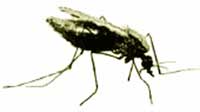Malaria menace
 THE threat of malaria epidemic looms large in Vadodara, Gujarat. The city has witnessed an alarming rise of such cases in the past one month. The Baroda Medical College (BMC) is registering more than 200 malaria cases every day, says a senior doctor in the hospital. Private medical practitioners, however, claim that more than 400 patients are being admitted to the hospital everyday. Ironically, government officials are silent over the whole issue.
THE threat of malaria epidemic looms large in Vadodara, Gujarat. The city has witnessed an alarming rise of such cases in the past one month. The Baroda Medical College (BMC) is registering more than 200 malaria cases every day, says a senior doctor in the hospital. Private medical practitioners, however, claim that more than 400 patients are being admitted to the hospital everyday. Ironically, government officials are silent over the whole issue.
Shireesh Patel, medical officer of health, Vadodara Municipal Corporation (VMC), told Down To Earth: "There is no doubt that the situation at present is alarming. However, the administration is making all efforts to counter the problem."
This is not the first time when such a large numbers of malaria cases have been reported in Vadodara, he said. In fact, the city has been witnessing an upsurge in malaria cases during rains for the last 10 years. This is mainly because of Vadodara's environment, which is ideal for mosquito-borne diseases, he says.
"During 1986-90, several cases of death were reported in Vadodara due to malaria. But the number of death cases have reduced now as people are gradually becoming aware of the killer disease," says Sailesh Trivedi, a physician in Vadodara. "In the last one month, I have treated about 500 malaria patients," he says. Apart from cases of malaria, there has been an increase of at least 15 per cent in the number of patients suffering from drug-resistant strain of typhoid fever in the past few years, Trivedi says.
Statistics prepared by health department reveal that about 1,058 malaria cases were registered in rural areas of Vadodara district during August, 1998, as against 1,080 cases in the same period of 1997. However, private practitioners dispute the official figures. In this season, private clinics receive more than 12,000 patients every month. Most of these patients come from rural areas. So how can one believe government data? he asks.
V T Javali, chief medical officer, Vadodara district, says that the Chota Udaypur village witnessed a large number of malaria cases last year. "Therefore, we have set up nine laboratories in rural areas and stationed medical officers to treat the patients. A particular type of insecticide which was earlier being used in the area was found to be ineffective to control malaria. So the officials had to use a stronger insecticide to kill the malaria bacteria in the village. This year, no such upsurge in malaria cases have come to our knowledge in the village so far," Javali says.
Interestingly, during June and July, 1998, seven cases of viral encepatilitis were reported in the village. The BMC and the National Institute of Communicable Diseases (NICD) have jointly initiated a study to find out the cause, says a senior officer of the BMC.
"We are trying our best to control malaria in the rural areas. The district administration has organised several malaria awareness camps in these areas," says Anju Sharma, district development officer, Vadodara. "But all our efforts would only be successful if people take precautions," she adds. According to Javali, the district administration has invested about Rs 5 crore in this programme.
"This time, the gods have come to our rescue," says Shireesh Patel of VMC. Heavy rains in the city might have killed mosquitoes. However, he cautioned that there was a need to be more vigilant than before. Water logging, which has been witnessed in at least 100 areas of Vadodara, could be dangerous as mosquitoes will breed at these places, he says.
J C Gandhi, additional director of health services, government of Gujarat, told Down to Earth that every year, the state government is forced to initiate fire-fighting measures. Once again, heavy floods in Surat and adjoining areas have posed a serious threat of mosquito-borne diseases. "We have pressed additional facilities to control the epidemic in the flood-hit regions," Gandhi adds. It remains to be seen whether these malaria-control measures will produce the desired results.
Related Content
- Researchers combine drug and vaccine to end malaria menace
- Dengue, Malaria alert! Mosquito menace flies high in Hyderabad
- Mosquito menace continues unabated, civic body clueless
- Mosquito sites need mapping
- Mosquito menace on rise, but half the posts in civic bodies lie vacant
- Japanese encephalitis cases rise in Tamil Nadu
